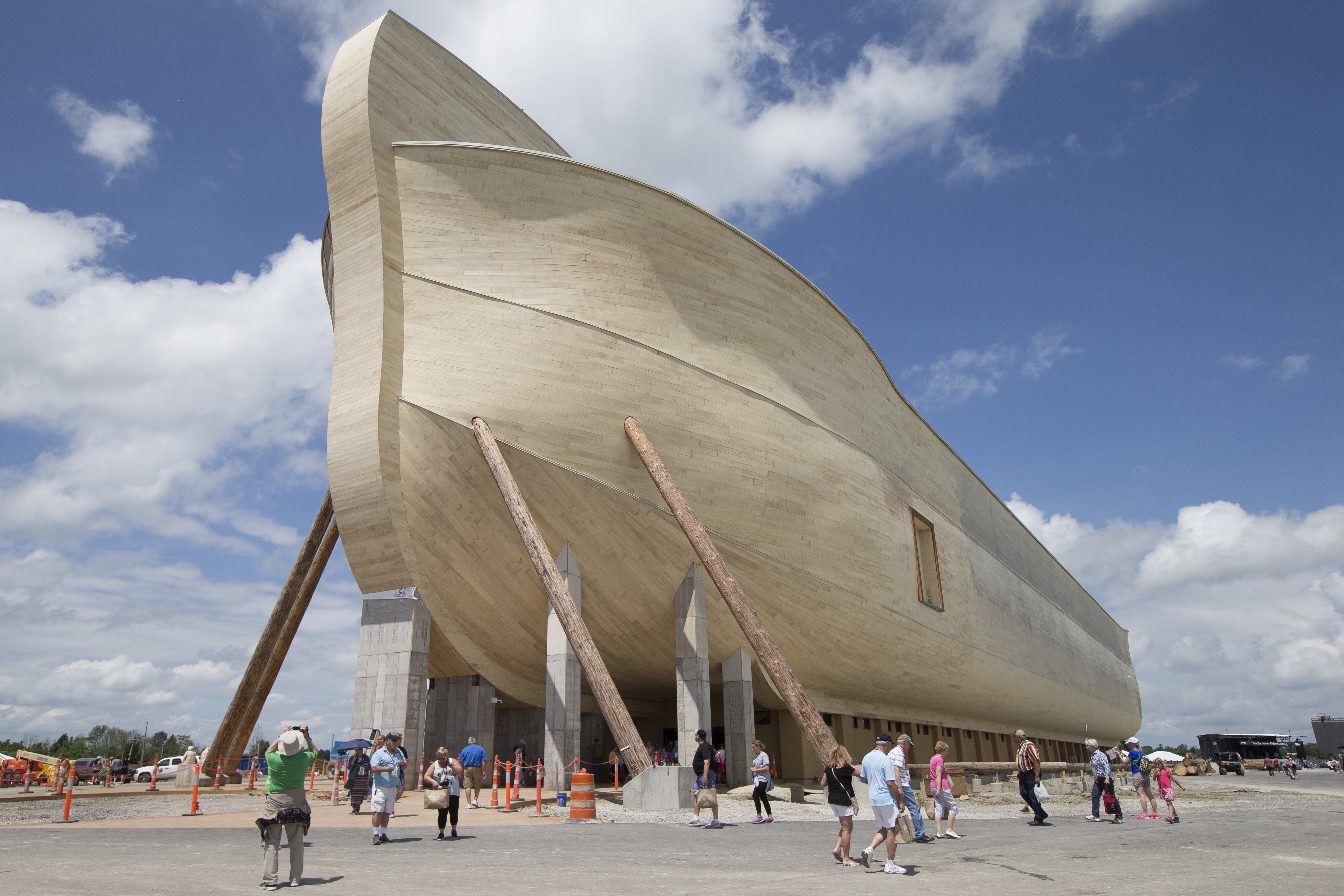For any other theme park, rain is a problem. But for the Ark Encounter and Answers in Genesis, it was providence.
![AP NOAHS ARK PARK A USA KY [image : 86863644]](http://www.gannett-cdn.com/media/2016/07/08/USATODAY/USATODAY/636035819315692639-ark.jpg)
The clouds and drizzle did little to dampen the spirit and anticipation of the 7,000 people who gathered Tuesday to get a sneak preview of the 500-foot-long, $100 million, life-sized replica of Noah's Ark in the Kentucky town of Williamstown. In fact, the weather only seemed to add to the excitement of the moment.
![A Jewish first whether it's Trump or Clinton: Column [oembed : 86866532] [oembed : 86866532] [oembed : 86866532] [oembed : 86866532]](/Portals/_default/Skins/PrestoLegacy/CommonCss/images/smartembed.png)
There has been no shortage of strong opinions about the ark since plans were announced to build it. Now that it is open, the controversy and debate will only intensify. The ark challenges beliefs, and when beliefs are challenged, intense debate tends to ensue. And much like the Creation Museum a few miles north, there is plenty here to discuss. Whether you're a creationist, an evangelical or an atheist, everyone who visits the ark will at some point ask themselves: What do I really believe?
![Texas Apache tribe flies free: Column [oembed : 86866430] [oembed : 86866430] [oembed : 86866430] [oembed : 86866430]](/Portals/_default/Skins/PrestoLegacy/CommonCss/images/smartembed.png)
Here are seven things (God's divine number) I believe following my visit there:
- Nothing says "America" like the ark. We do everything big in America. We like big cars, mansions, skyscrapers, roller coasters and super-sized meals. The ark, the world's largest free-standing wooden structure, fits right in. But the ark is also a reminder of what makes America so great. Despite all the controversy and disagreement about the ark, the fact that a religious group can build it without government censorship or a war breaking out speaks volumes about what sets our country apart from others. We see how religious differences are tearing apart the Middle East, but not here in America. Yes, there will be some protesters out at the ark with signs and rhetoric. But the fact that we can remain mostly peaceful in America despite our sometimes vastly different beliefs makes this the greatest nation on the planet.
- Ken Ham is very good at what he does. The ark couldn't have a better pitchman than Ken Ham, the founder, president and CEO of Answers in Genesis. Granted, he was playing to a friendly crowd at Tuesday's press conference (I've never been to a presser where the interviewee was surrounded by thousands of applauding fans), but Ham handled himself well. He had thoughtful answers to every question posed and didn't run from controversial topics such as tax breaks received by the ark. You don't have to agree with Ham to appreciate his charisma and ability to stay on message in spite of his critics.
- The ark will change some minds, but not the majority. In the spectacle that is the ark, it can be easy to forget that its main purpose, according to Ham, is ministry. For many visitors and even those who work there, the Ark Encounter will be a religious experience. There will even be those who convert to Christianity based on their experience there. Ham spoke of one construction worker who turned his life over to Jesus Christ just from working on the project. Calling the ark "the greatest Christian outreach of this era," he said 40 percent of visitors are expected to be non-Christians. However, belief systems aren't easily changed, and I think the majority of visitors will remain unmoved from their current set of beliefs. It will be hard for many people, including some Christians, to accept the idea of dinosaurs on the ark and other very literal interpretations of the Bible contained there. Despite its best effort, the ark also lacks the "hard evidence" that many skeptics will require before accepting the story of Noah's Ark as truth. The basis of any faith is having to accept as truth some things that lack clear, visible evidence. Those seeking hard proof and definitive answers will surely leave the ark disappointed. But I'm sure AiG will consider any persons converted, even if only one, a victory.
- Science and religion are not adversaries. The Bible teaches that God is incomprehensible, but also that God is knowable. In other words, humans cannot possibly know everything about God who is infinite, but we can grow in our knowledge of God in at least a limited sense. As a believer in God, I think that science is one of the ways in which we can grow in our knowledge of God and creation in that limited sense. Science, to me, is not about disproving the existence of God, but helping us to better understand the ways in which he orders the universe. It's hard for me to look at the natural order of our world and believe that somehow it is the product of a completely random phenomenon. Science and religion share an interest in the pursuit of truth and greater knowledge of our origins.
- Debate about the ark is a good thing. There's a saying that there's no such thing as bad publicity. I believe all the conversation surrounding the ark — positive and negative — is a good thing. It has people thinking about their faith (or lack thereof), which can can draw them closer to God. It also gives believers a chance to spread the biblical message to those who might be receptive to something they have never heard before or had little knowledge about.
- The ark raises the stakes for religious attractions. The ark could be a new beginning for Christian-themed attractions. Its size and scale makes it more than a Bible museum. It is a truly immersive, visceral experience that literally puts visitors in the midst of the Noah's Ark story in the Bible. It's these sorts of experiences that have made theme parks like Disney and Universal Studios such big hits with guests. People don't just want to hear stories and history, they want it to come alive for them. They want to be a part of the story. While Ham says the ark is more than entertainment, the reality is that visitors — Christian or not — expect a little entertainment value and to be engaged. For Christian-themed attractions that can be a delicate but necessary formula. But if the ark is successful, it could be the launching pad for a host of other immersive Christian-themed attractions. Could you imagine a life-sized Tower of Babel? Or, with today's digital technology, how about a parting-of-the-Red-Sea experience or going inside the belly of the whale with Jonah?
- The Ark Encounter is going to make lots of money. If Tuesday's gathering of 7,000 is any indication of how the ark is going to be received, then the Answers in Genesis accountants better get ready. Ken Ham said he expects 1.4 to 2.2 million people to visit the ark annually. At $40 per adult ticket that adds up to big bucks. And that's not even factoring in all the hats, T-shirts, food, beverages and other swag that will be sold in the gift shops and restaurants. The ark is such an architectural marvel that it will draw people not just from across the country, but from around the world. I spoke with one couple who drove 10 hours from Augusta, Ga., just to be among the first inside. We can debate whether the ark will actually have the $4 billion economic impact that Ham says it will, but what's not in question is whether it will be an economic success. My suggestion to those planning to attend: arrive early in the day.
Kevin S. Aldridge is the associate opinion editor for the Cincinnati Enquirer, where this column first appeared.
In addition to its own editorials, USA TODAY publishes diverse opinions from outside writers, including our Board of Contributors. To read more columns, go to the Opinion front page and follow us on Twitter @USATOpinion.


